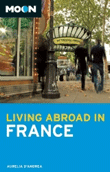Moving to Paris: Renting in Paris
Summary: If you're moving to Paris and planning to rent, Aurelia d'Andrea offers advice about renting in Paris.
Short-Term Rentals
If you don't have someone with very strong ties to France arranging your move for you, you're probably going to need to give up on the notion of finding an unfurnished rental. They do exist, but they're very hard to get your hands on as a solo-flying expat on a non–corporate executive's budget. For the short term, it's usually preferable to set up in a furnished place anyway, since you'll just need something in the interim until your cargo container arrives or while you scope out a permanent place to live. And if you're only staying for a brief period, a furnished rental unit makes a lot of sense.
Your options for short-term rentals are vast and varied. You can go through a big agency that will likely charge you a big fee or a mom-and-pop business offering the same service but charging less, or you can bypass surcharges altogether by working directly with a landlord, who might himself be a subtenant to another landlord. There is a bit of risk involved in the latter option on both the landlord and tenant's sides; you are being entrusted to someone else's property, and you're handing over your hard-earned cash to someone you hope is on the up and up. Odds are they will be, but always trust your instincts -- if something doesn't feel right, don't feel obligated to follow through. In any situation, it is advisable to always leave a paper trail and to draft a lease, even if the person renting to you doesn't think it's necessary or, more likely, didn't think of it.
Within the law, short-term rentals of a year or less that don't come with a lease are supposed to be rented only to tenants who have a primary residence other than the one being rented. This would be a challenge for anyone to disprove, and rarely is it an issue in terms of the law cracking down on you, but the person renting to you may ask you to sign a paper stating as much to cover his or her tail.
For a nice cross-section of short- and long-term rentals throughout France, try www.rentaplaceinfrance.com. The friendly owners, Ross and Karin Husband, are English speakers originally from Scotland who will help you find a place to live and answer all of your questions. The American Chamber of Commerce in France also offers recommendations for short-term rental agencies at www.amchamfrance.org.
If you're looking for a temporary sublet, summer is a great time to check out Paris and other big cities while the locals flee to the sea and countryside for their multiweek escapes. You will have lots of room to negotiate, since people don't want to get stuck paying all their rent while they're away, and you'll get to experience what it could be like to live in a real French home (versus a sterile short-term rental unit).
Long-Term Rentals
A long-term rental has lots of advantages: It allows you to get to know a place before buying, lets you feel more integrated in a community knowing you won't have to pick up and leave in three months, and often is a lot less expensive than a short-term arrangement. The only problem is finding a long-term rental, though that isn't necessarily a problem if you have the luxury of time.
As with short-term rentals, it's possible to go through an agency whose specialty is expatriate rental services, but you will pay a premium, usually in the form of a "finder's fee" surcharge amounting to the equivalent of one month's rent or a percentage of the rent you'll pay over the months (or years) you'll be staying. It's also possible to go through an immobilier, a real estate agent who often deals in rental units as well as selling homes. The tricky part will always be to meet the dossier demands, which generally require three French pay stubs proving that you earn several times the amount of the rent, a garant's attestation, and more.
It's no secret that French landlords like renting to North Americans. They know you'll be leaving for your "real" home at some point, and therefore won't be taking advantage of the tenant-friendly laws that essentially guarantee you can't be forcibly evicted. This also allows many landlords to get around the law that says empty units must be rented under a three-year lease; many North Americans are staying only for a year or two, so the landlord won't be locked in a long-term situation. You're also generally considered more financially stable than your French counterparts, making you prime tenant material.
Renting directly from the owner gives you a lot of flexibility; you can negotiate the removal of existing furniture, open a discussion about filling voids -- for example, if your "furnished" apartment doesn't come with a TV or washing machine, you may be able to persuade the proprietaire that these are necessities. (As always, ask nicely and be prepared to make a convincing argument if necessary.) Sometimes you can negotiate both the rent and the length of your stay. So there's a lot to be said for finding your home this way. Even though it's not as popular in France as in North America, Craigslist is a good place to start your search, especially if you'll be settling in Paris. You'll find a broad variety of possibilities, and the people advertising are almost always Anglophones. One thing to be wary of: There have been some scams popping up on Craigslist lately, and they almost always involve 1) a deal that's too good to be true (such as a luxury apartment for €750 per month) and/or 2) a request for money transfers or wires before you've even seen the place. Don't sign anything, and don't hand over a euro until you've seen the place -- and the person renting it -- in person.
Particulier à Particulier (www.pap.fr) advertises apartments and houses directly from the owner, so if your French skills are up to snuff, you can prob- ably circumvent the challenges inherent in working with an agency -- namely, a rigid set of dossier requirements. In addition to the website, PAP publishes a thick, oversize journal every Thursday. Pick it up at newsstands for €2.95, and you'll have access to thousands of ads. Brush up on your French and be prepared to pick up the phone to get the best deals. If your French isn't that good but you have a friend who's fluent, have her make the call for you.
Shared Rentals
Finding a colocation (shared rental) situation in France is relatively simple, par- ticularly in university towns with large student populations. The site to visit to find your next roommate situation is www.colocation.fr, but it will benefit you greatly if you speak French. You do want that €100 living situation, don't you? The downside to this otherwise wonderful site is that to access the contact information of your potential new roommate, you have to pay for the ac- cess number; usually the fee is less than €2, but if you're calling more than a handful of people, it adds up. A no-cost option is www.recherche-colocation.com -- also in French, but at least membership is gratuit (free). If you're still most comfortable with an English-language publication, head straight for the old tried-and-true FUSAC and Craigslist.
Rental Agents and Leases
Before signing on the dotted line, you'll want to have some sort of contract in place, even if it's just a simple form you downloaded off the internet 10 minutes before your hand-over-keys meeting. (You and your landlord wouldn't be the first.) What you sign and what kind of information it contains hinges on what you're renting and the landlord's level of professionalism. Let's say you're renting a furnished apartment in Nice directly from an owner who takes the matter rather seriously and has taken steps to keep the transaction on the up and up. In this case, you can expect to be presented with a lease contract or rental (bail à loyer or contrat de location) containing the following information:
- Name of the owner, contact information, and rental address
- A description of the rental: floor, door, dimension in square meters
- A mention of communal access and services: a courtyard, bike parking, elevator
- A definition of purpose: whether the space is for living or working
- The length of the contract and whether it's renewable or not
- An outline of the charges -- rent, taxe d'habitation, electricity -- and when they are made payable
- The amount of your security deposit
- An outline of any proposed work to be done on the dwelling, including dates and whether less or more rent will be charged as a result
- A statement indicating that the renter will leave the space in the same state it was rented out in to guarantee you get your deposit back.
In keeping with the up-and-up theme: Even if you're not asked to provide a full-fledged dossier, you may be asked to provide proof of renter's insurance and income. Paying your last month's rent up front is not legally mandated, but land- lords are legally entitled to ask for a deposit equal to one month's rent. They have two months to return it to you once you've moved out. You, on the other hand, can ask your landlord-to-be for a certificat de ramonage, which certifies they've had the chimney swept so you can have a cozy little fire roaring in the fireplace.
From the book Moon Living Abroad in France by Aurelia d'Andrea. Excerpted by arrangement with Avalon Travel, a member of the Perseus Books Group. Copyright © 2012. For more information, visit http://www.moon.com.
About the Author
Freelance journalist and author of Moon Living Abroad in France Aurelia d'Andrea's love affair with Paris was first launched by her high school French class, but it really took flight in 2004 when she spent a year in the City of Light, fueled by a steady diet of baguettes, Bordeaux, and cobblestone promenades. Five years later, she packed up her San Francisco apartment for a second time and schlepped her husband, dog, and seven bicycles back to the French capital.
With two moves under her belt, Aurelia no longer dreads the dossier or fears a visit to the préfecture. Instead, she's learned to embrace the paper trail and accept her perpetually deficient French grammar, which the dogs she walks don't seem to notice. While scooping poop wasn't exactly the glamorous Parisian career she initially had in mind, this former magazine editor is happy to work as a professional promeneur de chiens by day and would-be novelist by night—especially since bread, wine, and urban exploration still dominate her daily to-do list.
Additional Information:
- France Guide
- Healthcare & Health Insurance in France
- Members Talk about Healthcare & Health Insurance in France
- Best Places to Live in France
- Real Estate in France
- Guide to Real Estate in France
- Pros & Cons of Living in France
- Cost of Living in France
- Pros and Cons of Living in France
- Chikungunya Disease in France
- Zika Virus in France
- How to Rent a Home in France
- Pros and Cons of Living in France 2025
- 2025 Guide to Moving to France






